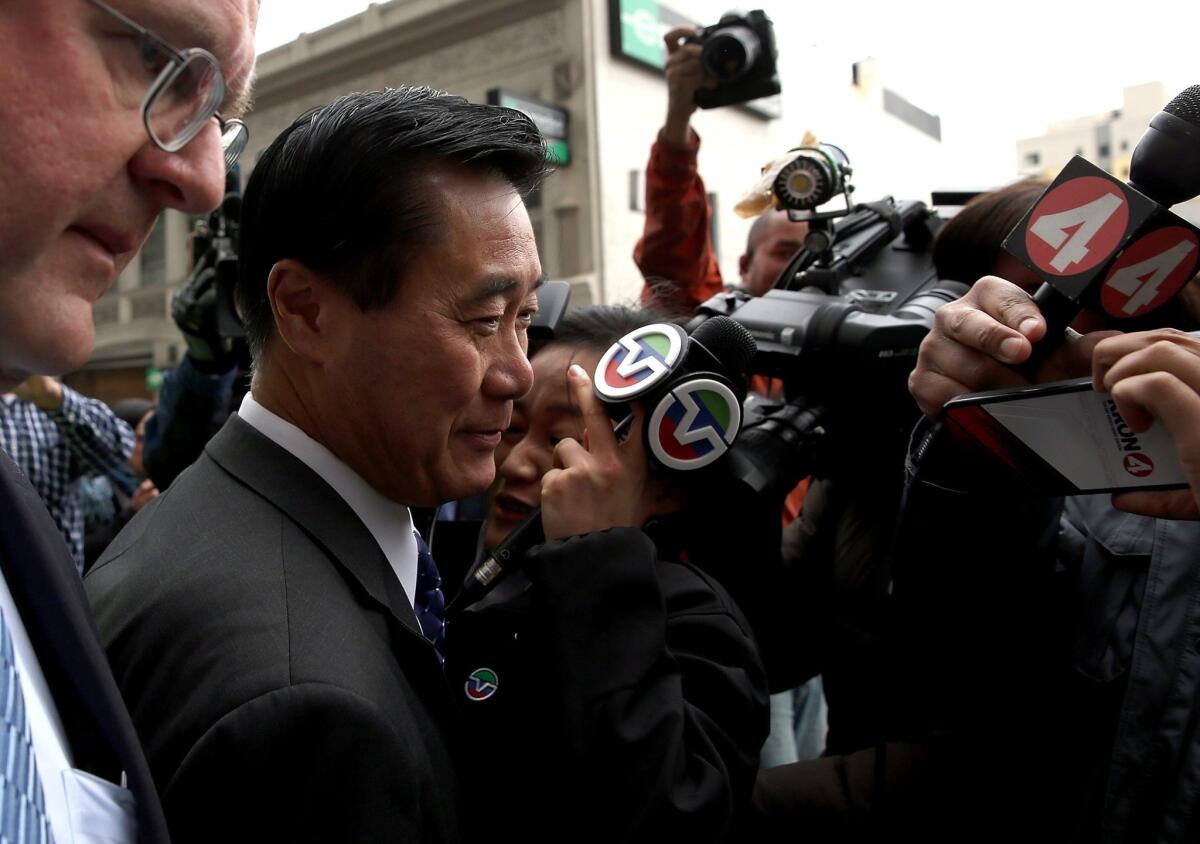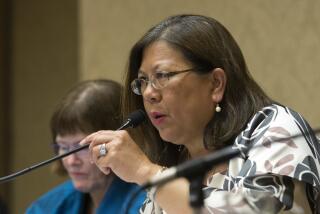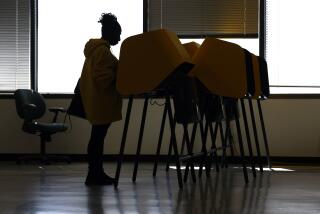Ethics a focus for 7 remaining California secretary of state candidates

SACRAMENTO — The arrest of a front-runner in the race for California secretary of state on corruption charges has made ethics a key issue for the seven candidates still in the contest.
State Sen. Leland Yee (D-San Francisco) quit the race after his arrest last month on charges of taking payments in exchange for official favors and conspiring to illegally traffic in firearms. He has pleaded not guilty.
As the remaining candidates focus on the best way to clean up Sacramento, Yee’s stumble has thrown the June primary competition wide open.
AT A GLANCE: Candidates for secretary of state
Yee, whose name will remain on the ballot, was the second-best-financed candidate for the state’s top elections job. The contestant with the most money, state Sen. Alex Padilla (D-Pacoima), is favored to grab at least one of the two runoff slots for November.
“With Yee out of the picture, it definitely opens up the race more to the other candidates,” said Tony Quinn, an editor of the nonpartisan California Target Book, which handicaps political races.
A recent Field Poll showed Padilla running second to Republican public policy specialist Pete Peterson, whose last quarterly disclosure report showed less than $2,000 in his campaign fund.
The secretary of state, with nearly 500 employees, oversees federal and state elections in California, maintains the public databases that disclose campaign contributions and lobbyist spending, and processes and maintains records related to corporations and other business entities.
Incumbent Debra Bowen, a Democrat, is prevented by term limits from running for reelection.
Besides Padilla, the other Democrats in the race are Derek Cressman, former vice president of the watchdog group Common Cause, and Jeffrey H. Drobman, a computer scientist and engineer.
There are two Republican candidates: Roy Allmond, a program technician in the secretary of state’s office, and Peterson, executive director of the Davenport Institute for Public Engagement and Civic Leadership, a think tank at Pepperdine University.
David Curtis, a designer in an architectural studio, is a Green Party candidate. Dan Schnur, on leave as director of the Jesse M. Unruh Institute of Politics at USC, is a “no party preference” candidate.
Padilla has a large advantage in campaign fundraising, having brought in $1.6 million, according to his required filings with the state. Cressman is a distant second in campaign cash, having raised $390,000 and lent himself $100,000.
All of the candidates say the state must upgrade the computer systems that register businesses and tell the public who contributes money to which politicians.
But they have clashed over what to do about the apparent prevalence of corruption in the Capitol as well as over how to handle Yee and Democratic Sens. Ronald S. Calderon and Roderick Wright, who are facing their own criminal charges.
Cressman and Schnur have criticized Padilla for voting last month to impose paid suspensions on the three. Schnur and Cressman said they should have been permanently expelled.
In voting for suspensions, Padilla noted that Yee and Calderon have not yet had their day in court. But he has called on all three lawmakers to resign.
As he has campaigned for secretary of state, Padilla has proposed a blackout on political fundraising for more than three months during the end of each legislative session. That’s when special interests seeking favorable votes on bills also flood legislators with campaign cash. The Legislature has not yet voted on his proposal.
Like most lawmakers, Padilla, 41, said fundraising has nothing to do with how he votes on bills.
“But the public perception has gotten to the point where it needs to be addressed,” he said. “The perception is that fundraising activity has an undue influence on how decisions are made in the Capitol.”
Padilla, who was president of the Los Angeles City Council before his 2006 election to the Senate, has also offered legislation that would require more frequent disclosure of campaign donations.
The secretary of state has no power to change laws to fight corruption but can persuade lawmakers to introduce bills that would change the status quo.
Cressman, 46, has proposed that a permanent independent ethics commission be established, with the power to investigate a broad range of misbehavior in the Legislature and to recommend or force a vote on the censure, suspension or expulsion of a lawmaker.
Cressman said such a panel would have more powers than the California Fair Political Practices Commission, whose jurisdiction is limited to campaign finance and conflicts of interest. As he envisions it, the commission would be more independent than the FPPC, which is appointed by the governor.
“We have had problems in the Legislature where they are unwilling to force those votes, and you have the inherent problem of asking people to police themselves,” said Cressman, a Sacramento resident.
A new commission could be created by the Legislature or by ballot initiative.
Cressman also would revise the printed Voters Guide sent out by the state in election years to give citizens more information. He wants a digital app that would give voters easy access to video footage of candidate debates and campaign finance data.
Schnur, a 50-year-old Los Angeles resident, is the former chairman of the Fair Political Practices Commission, the state’s campaign finance watchdog authority.
He would ban state lawmakers from fundraising while the Legislature is in session to reduce the sway of special interests.
“The primary cause of the culture of corruption in the state Capitol is the link between political fundraising and government action,” said Schnur, a Los Angeles resident. “If we forbid fundraising while the Legislature is in session, we can weaken that link and begin to clean up that culture.”
Schnur also supports requiring campaign contributions to be reported within 24 hours of receipt and barring the use of campaign funds for legal expenses to fight criminal charges.
Drobman, 65, has worked in the computer industry, so he says he is the most qualified candidate to tackle the outdated and poor-performing technology in the secretary of state’s office.
The Westlake Village resident’s goals include eventually making it possible for people to vote anywhere, any time on any electronic device, including a smartphone. In the interim, he would allow people to vote at the polls with iPads and personal computers.
“It’s convenience,” Drobman said. “You would have easier access, so it should increase voter turnout.”
Peterson, 47, lives in Santa Monica and is an expert on increasing civic participation in government decision-making. He would set a 48-hour time limit for the state to process business registrations.
He also would pursue better technology to facilitate election-day registration and early voting. He supports a return to electronic voting at the polls.
“We are an electronic laggard when it comes to election technology,” Peterson said.
Bowen ended electronic voting several years ago because of security concerns, but Peterson said technology has improved.
Candidate Allmond is a program technician in the secretary of state’s office who says he has inside knowledge of its problems and how to fix them. The 54-year-old Sacramento resident would replace paper ballots with electronic voting at polling places.
“Right now, the paper ballot won’t tell you if you’ve done something wrong and your vote won’t count,” Allmond said.
AT A GLANCE: Candidates for secretary of state
The Green Party’s Curtis, 49, lives in the unincorporated Lucas Valley area of Marin County. His priorities include modifying the top-two primary system so more than two candidates could compete in the general election based on some standard such as a strong performance in the primary.
Current primary rules mean minor party candidates are no longer guaranteed a place on the general election ballot, he said.
“Everyone is talking about how there is not enough voter participation, and when you scrub all the minor parties off the general election, you have just disenfranchised a bunch of voters,” Curtis said. “They have no incentive to participate in the general election.”
More to Read
Start your day right
Sign up for Essential California for news, features and recommendations from the L.A. Times and beyond in your inbox six days a week.
You may occasionally receive promotional content from the Los Angeles Times.







